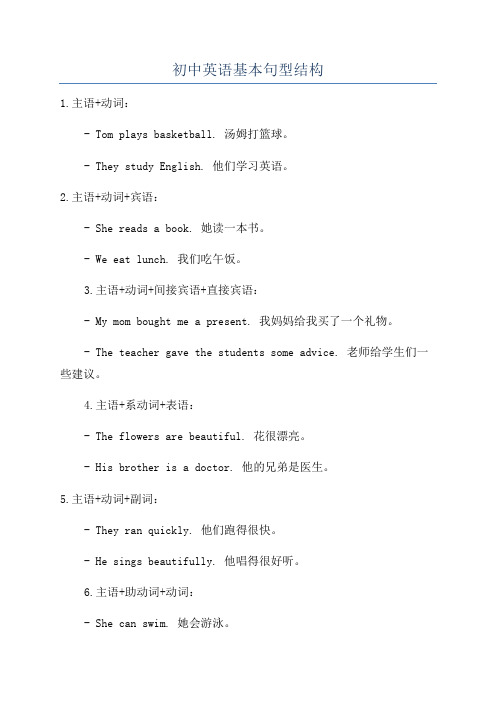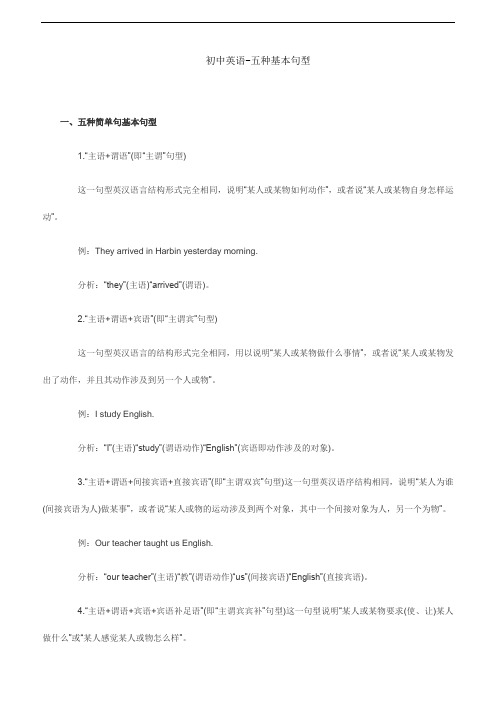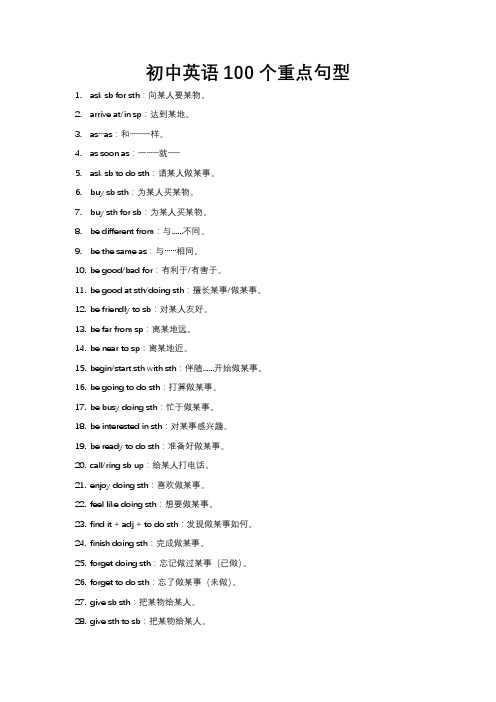初中英语基本句型
初中英语基本句型结构

初中英语基本句型结构1.主语+动词:- Tom plays basketball. 汤姆打篮球。
- They study English. 他们学习英语。
2.主语+动词+宾语:- She reads a book. 她读一本书。
- We eat lunch. 我们吃午饭。
3.主语+动词+间接宾语+直接宾语:- My mom bought me a present. 我妈妈给我买了一个礼物。
- The teacher gave the students some advice. 老师给学生们一些建议。
4.主语+系动词+表语:- The flowers are beautiful. 花很漂亮。
- His brother is a doctor. 他的兄弟是医生。
5.主语+动词+副词:- They ran quickly. 他们跑得很快。
- He sings beautifully. 他唱得很好听。
6.主语+助动词+动词:- She can swim. 她会游泳。
- They should study harder. 他们应该更加努力学习。
7.主语+情态动词+动词:- We must go now. 我们必须现在出发。
- You should listen to your parents. 你应该听父母的话。
8.主语+谓语+介词短语:- The cat is on the table. 猫在桌子上。
- We live in a big city. 我们住在一个大城市里。
9.反意疑问句:- You are a student, aren't you? 你是学生,不是吗?- They can swim, can't they? 他们会游泳,对吗?这些是初中英语基本句型结构的常见例子,可以根据需要进行变化和扩展。
初中英语句子成分+-五大基本句型(22张)可编辑全文

简单句的五种基本句型口诀:
英语句子万万千, 一种简单主谓型, 三种常见主系表, 五种主谓宾补型,
五种句型把线牵。 二种基本主谓宾, 四种主谓加双宾, 各种句型记心中。
Practice : work in groups
请判断下列句子的结构类型
• 1.He is running. • 2.The loud voice made him angry. • 3. Danny gave me an apple. • 4.She seemed angry. • 5.They laughed. • 6.I like English. • 7.My mother bought me a bike. • =My mother bought a bike for me. • 8.Jenny saw Danny buy many donuts. • 9.Jenny looks very happy. • 10.Ms.liu is kind.
7
6)表语:用来说明主语的性质 或状态。一般由名词或者形容词 担任。 如:This table is long. (这个桌子是长的。)
8
句子按照句子结构分类,可分为简单句、并列句 和复合句。句子的直接成分是主语和谓语。 简单句是只包含一个主语(或并列主语)和一个谓语 的句子,简单句分为五种基本句型。
英语基本句型
Miss Peng
1
英语句子成分分析
一个句子一般由两部分构成, 即主语部分和谓语部分, 这两部分也叫做句子的 主要成分。句子的次要成分 包括宾语,定语,状语,表语等。
2
1)主语:是一句话的主体,常用名词, 数词或代词担任,一般放于句首。如: Students study. (学生学习。) We are friends.(我们是朋友) 这两句话中单词students是个名词, we是代词,它们在句中做主语。
初中英语句型及总结归纳

初中英语句型及总结归纳英语是我们学习的一门重要课程,而句型是英语中的基础。
在初中英语学习中,我们掌握了许多常用的句子结构,这些句型在日常交流和写作中都起到了关键的作用。
本文将对初中英语的句型进行总结归纳,帮助大家更好地掌握和运用这些句型。
一、陈述句陈述句是我们最常用的句子类型,用来陈述事实、描述情况。
以下是一些常见的陈述句型:1. 主语 + 动词 + 宾语例如:I like pizza.(我喜欢比萨。
)2. 主语 + be动词 + 表语例如:She is a teacher.(她是一名教师。
)3. 主语 + do/does + 动词原形例如:They do their homework every day.(他们每天做作业。
)4. 主语 + have/has + 过去分词例如:He has finished his homework.(他已经完成了作业。
)二、疑问句疑问句用于提问,帮助我们获取信息。
以下是一些常见的疑问句型:1. 疑问词 + 助动词 + 主语 + 动词?例如:What do you like?(你喜欢什么?)2. 助动词 + 主语 + 动词?例如:Do you play basketball?(你打篮球吗?)3. 特殊疑问句例如:Where did you go yesterday?(你昨天去哪里了?)三、祈使句祈使句用于表达请求、命令或建议。
以下是一些常见的祈使句型:1. 动词原形 + 其他成分例如:Open the window, please.(请打开窗户。
)2. 动词原形 + 不定代词/名词例如:Eat some fruit.(吃些水果。
)四、感叹句感叹句用于表达惊讶、赞美、喜悦等情感。
以下是一些常见的感叹句型:1. How + 形容词/副词 + 主语 + 动词!例如:How beautiful the flowers are!(花儿多美啊!)2. What + 形容词 + 名词 + 主语 + be动词!例如:What a lovely dog he has!(他有一只多可爱的狗啊!)五、条件句条件句用于表达假设、条件和结果之间的关系。
初中英语基本句型大全

初中英语基本句型大全1. 主语 + be动词- I am a student.- She is my sister.2. 主语 + 动词- They play soccer.- He sings well.3. 主语 + 动词 + 直接宾语- We eat apples.- Mary likes ice cream.4. 主语 + 动词 + 间接宾语 + 直接宾语- Mike gave me a present.- My parents bought me a new bike.5. 主语 + 动词 + 宾语 + 宾语补足语- I find the book interesting.- We consider him our best friend.6. 主语 + 助动词 + 动词- They can swim.- He should study harder.7. 主语 + be动词 + 形容词- The weather is beautiful.- My dog is cute.8. 主语 + be动词 + 名词- She is a teacher.- They are students.9. 主语 + be动词 + 不定式- I am happy to see you.- He is ready to go.10. 主语 + be动词 + 现在分词- The children are playing in the park.- The flowers are blooming beautifully.11. 主语 + be动词 + 过去分词- The house was built last year.- The cake was eaten by the children.12. 主语 + have/has + 过去分词- I have finished my homework.- She has written a letter.13. 主语 + have/has + been + 现在分词- We have been waiting for an hour.- He has been studying all day.14. 主语 + have/has + been + 过去分词- They have been invited to the party.- She has been praised for her hard work.15. 主语 + was/were + 动词的-ing形式- I was reading a book when he called.- They were playing basketball at that time.16. 主语 + 动词不定式- You should listen carefully.- We need to study for the test.17. 主语 + 即将/打算 + 动词原形- I am going to visit my grandparents next week.- They are planning to go on a trip.18. 主语 + can/could + 动词原形- She can swim.- They could speak Chinese when they were young.19. 主语 + must/mustn't + 动词原形- You must finish your homework before you go out.- They mustn't smoke in the building.20. 主语 + may/might + 动词原形- He may come to the party tonight.- It might rain tomorrow.21. 主语 + should + 动词原形- We should help people in need.- You should apologize for your mistake.22. 主语 + would like + to + 动词原形- I would like to go shopping with you.- They would like to eat dinner at the restaurant.23. 介词短语作状语- She went to school by bus.- We played soccer in the park.24. 介词短语作定语- The book on the table is mine.- The girl with long hair is my sister.25. 定语从句- The woman who is wearing a red dress is my mother.- The book that I borrowed from the library is very interesting.26. 状语从句- I will go swimming if it is sunny tomorrow.- She cried because she failed the exam.27. 名词性从句- What he said is true.- I don't know where she lives.28. 并列句- He likes apples, but he doesn't like oranges.- I want to go to the movies, and she wants to stay home.29. 条件句- If it rains, we won't go to the park.- She will buy a new dress if she has enough money.30. 倒装句- Never have I seen such a beautiful sunset.- Not only did he study English, but he also learned French.以上是初中英语基本句型大全,包括了主谓结构、宾语结构、状语结构、从句等等。
初中英语-五种基本句型

初中英语-五种基本句型
一、五种简单句基本句型
1.“主语+谓语”(即“主谓”句型)
这一句型英汉语言结构形式完全相同,说明“某人或某物如何动作”,或者说“某人或某物自身怎样运动”。
例:They arrived in Harbin yesterday morning.
分析:“they”(主语)“arrived”(谓语)。
2.“主语+谓语+宾语”(即“主谓宾”句型)
这一句型英汉语言的结构形式完全相同,用以说明“某人或某物做什么事情”,或者说“某人或某物发出了动作,并且其动作涉及到另一个人或物”。
例:I study English.
分析:“I”(主语)“study”(谓语动作)“English”(宾语即动作涉及的对象)。
3.“主语+谓语+间接宾语+直接宾语”(即“主谓双宾”句型)这一句型英汉语序结构相同,说明“某人为谁(间接宾语为人)做某事”,或者说“某人或物的运动涉及到两个对象,其中一个间接对象为人,另一个为物”。
例:Our teacher taught us English.
分析:“our teacher”(主语)“教”(谓语动作)“us”(间接宾语)“English”(直接宾语)。
4.“主语+谓语+宾语+宾语补足语”(即“主谓宾宾补”句型)这一句型说明“某人或某物要求(使、让)某人做什么”或“某人感觉某人或物怎么样”。
初中英语100个重点句型

初中英语100个重点句型1.ask sb for sth:向某人要某物。
2.arrive at/in sp:达到某地。
3.as…as:和……一样。
4.as soon as:一……就……5.ask sb to do sth:请某人做某事。
6.buy sb sth:为某人买某物。
7.buy sth for sb:为某人买某物。
8.be different from:与......不同。
9.be the same as:与……相同。
10.be good/bad for:有利于/有害于。
11.be good at sth/doing sth:擅长某事/做某事。
12.be friendly to sb:对某人友好。
13.be far from sp:离某地远。
14.be near to sp:离某地近。
15.begin/start sth with sth:伴随......开始做某事。
16.be going to do sth:打算做某事。
17.be busy doing sth:忙于做某事。
18.be interested in sth:对某事感兴趣。
19.be ready to do sth:准备好做某事。
20.call/ring sb up:给某人打电话。
21.enjoy doing sth:喜欢做某事。
22.feel like doing sth:想要做某事。
23.find it + adj + to do sth:发现做某事如何。
24.finish doing sth:完成做某事。
25.forget doing sth:忘记做过某事(已做)。
26.forget to do sth:忘了做某事(未做)。
27.give sb sth:把某物给某人。
28.give sth to sb:把某物给某人。
29.get to sp:达到某地。
30.go on doing sth:继续做同一件事。
31.go on to do sth:继续做另一件事。
初中英语五大基本句型
初中英语五大基本句型初中英语共有五大基本句型,它们是简单句、并列句、复合句、选择疑问句和特殊疑问句。
下面将详细介绍这五种句型及其用法。
1. 简单句(Simple Sentence)简单句由一个主语和一个谓语构成,表达一个完整的叙述意思。
句子中可以有其他成分如宾语和状语等。
例如:- I like cats.(我喜欢猫。
)- She is reading a book.(她在读一本书。
)- We played football yesterday.(我们昨天踢足球。
)2. 并列句(Compound Sentence)并列句由两个或多个简单句通过连词连接而成。
这些简单句相互独立,不依赖于其他句子。
一般使用连词and, but, or等。
例如:- I like to swim, and my brother likes to play basketball.(我喜欢游泳,我弟弟喜欢打篮球。
)- She is studying for her test, but I'm watching TV.(她在为她的考试学习,但是我在看电视。
)- You can choose to go to the beach or stay at home.(你可以选择去海滩还是待在家里。
)3. 复合句(Complex Sentence)复合句由一个主句和一个或多个从句构成。
主句是完整的句子,而从句是一个依附于主句的不完整的句子。
从句可以是名词从句、定语从句或状语从句。
例如:- I know that she is coming to visit us tomorrow.(我知道她明天要来看我们。
)- The book that I borrowed from the library is very interesting.(我从图书馆借的那本书很有趣。
)- We will go to the park if it doesn't rain tomorrow.(如果明天不下雨,我们会去公园。
基本句型(14张PPT)初中英语专项复习课件
3. 主 + 动 + 宾(SVO) 常见的及物动词: love say take sell know call order draw 等.例句
• She is washing clothes. • 她在洗衣服. • I saw a beautiful girl . • 我看见一个漂亮的女孩. • Tom watches TV every evening . • 汤姆每天晚上看电视. • She doesn’t like her brother . • 她不喜欢她哥哥. • Speak English ,please. • 请讲英语. • The house was built last year. • 这座房子是去年建的. • Will you help me ? • 你会帮助我吗? • Most of us enjoy English very much . • 我们中大多数人非常喜欢英语.
基本句型
初中英语专项复习
基本句型(Basic Sentence Patterns):
英语中千变万化的句子归根结底都是由以下五种基本句型组合、扩 展、变化而来的: 1)主 + 动(SV)例如: I work. 我工作。 2)主 + 动 + 表(SVP)例如: John is busy. 约翰忙。 3)主 + 动 + 宾(SVO)例如: She studies English. 她学英语。 4)主 + 动 + 宾 + 补(SVOC)例如: Time would prove me right. 时-间会证明我是对的。 5)主 + 动 + 间宾 + 直宾(SVOiOd)例如: My mother made me a new dress. 我母亲给我做了一 件新衣裳。
初中英语句子成分分析及五种基本句型
初中英语句子成分分析及五种基本句型- 主语:句子中执行动作或被动执行动作的人、动物或物体,通常作为句子的主体。
例如:"Peter runs every morning."(彼得每天早上跑步。
)这里的主语是"Peter"。
- 谓语:句子中的动词,表示主语进行的动作或状态。
例如:"They are playing soccer."(他们正在踢足球。
)这里的谓语是"are playing"。
- 宾语:句子中受动作影响的人、动物或物体,通常是动词的直接或间接对象。
例如:"She gave me a present."(她送给了我一个礼物。
)这里的宾语是"a present"。
- 定语:修饰名词或代词的词或词组,通常用来描述或限制名词或代词的特性。
例如:"The red car is mine."(那辆红色的车是我的。
)这里的定语是"red"。
- 状语:修饰动词、形容词、副词或整个句子的词或词组,用来说明动作、状态、方式、时间、地点、原因等。
例如:"He speaks English fluently."(他流利地说英语。
)这里的状语是"fluently"。
五种基本句型:初中英语中常见的五种基本句型包括:主谓句、主谓宾句、主谓表句、主系表句和疑问句。
1. 主谓句:由主语和谓语构成的句子。
例如:"The dog barks."(那只狗叫。
2. 主谓宾句:由主语、谓语和宾语构成的句子。
例如:"She readsa book."(她读一本书。
)3. 主谓表句:由主语、谓语和表语(通常是形容词或名词)构成的句子。
例如:"The cake tastes delicious."(这块蛋糕尝起来很美味。
初中英语知识点归纳基本句型及语法结构
初中英语知识点归纳基本句型及语法结构初中英语知识点归纳:基本句型及语法结构英语作为一门外语,初中时期的学习是打下基础的关键阶段。
掌握基本句型和语法结构对于学生的英语学习至关重要。
本文将归纳总结初中英语中的基本句型和语法结构,帮助初学者更好地理解和掌握英语语法知识。
一、基本句型1. 断言句断言句即陈述句,用于陈述一个事实或观点。
基本结构:主语 + 谓语 + 其他成分。
例句:He is a student.(他是一个学生。
)2. 疑问句疑问句用于询问事实、情况、原因等。
基本结构:疑问词/助动词 + 主语 + 谓语 + 其他成分?例句:Where is the library?(图书馆在哪里?)3. 否定句否定句用于表达相反的意思。
基本结构:主语 + be动词/助动词/情态动词 + not + 其他成分。
例句:I am not tired.(我不累。
)二、语法结构1. 一般现在时一般现在时用于表达经常性、普遍性的动作或状态。
结构:主语 + 动词原形/+s/es + 其他成分。
例句:She goes to school every day.(她每天上学。
)2. 一般过去时一般过去时用于表示过去发生的动作或状态。
结构:主语 + 动词过去式 + 其他成分。
例句:He played football yesterday.(他昨天踢足球。
)3. 现在进行时现在进行时用于表示现在正在进行的动作。
结构:主语 + be动词 + 现在分词 + 其他成分。
例句:They are watching a movie.(他们正在看电影。
)4. There be句型There be句型用于存在某人或某物。
结构:There is/are + 某物 + 其他成分。
例句:There is a cat on the table.(桌子上有一只猫。
)三、特殊句型和语法结构1. 祈使句祈使句用于发出命令、请求、建议等。
结构:动词原形+ 其他成分。
- 1、下载文档前请自行甄别文档内容的完整性,平台不提供额外的编辑、内容补充、找答案等附加服务。
- 2、"仅部分预览"的文档,不可在线预览部分如存在完整性等问题,可反馈申请退款(可完整预览的文档不适用该条件!)。
- 3、如文档侵犯您的权益,请联系客服反馈,我们会尽快为您处理(人工客服工作时间:9:00-18:30)。
初中英语基本翻译句型大全1. It's time to go home./to play computer games./ for school.是回家/玩电子游戏/上学的时候了。
2. It's bad for you to spit on the ground. 随地吐痰不好。
Smoking is bad for your health. 抽烟不利于你的健康。
Too many sweets are bad for your teeth. 吃过多的糖对你的牙齿有害。
3. It took me half an hour to fall asleep last night.昨天夜里我花了半个小时才入睡。
4. You'd better put away all your clothes./go over your homework again./ read more books.你最好把你的衣服收好/再检查一遍你的作业/多读几本书。
You'd better not go until your aunt arrives. 你最好等你的姨妈到了以后再走。
5. What's wrong with the animal? 这动物怎么啦?6. Before the operation he used to have a headache.在未动手术之前,他以前经常头痛。
I used to go hiking when I was young. 我年轻时经常外出徒步旅行。
7. I'd like to go there on foot. / by bus. 我愿意步行/坐公共汽车到那儿去。
Would you like him to make a phone call to you? 您愿意他打电话给您么?8. I can't wait to pack my bag. 我等不及打我的包了。
9. Let's hurry so that we can get there before supper.让我们抓紧时间,这样才能在晚饭前赶到那里。
My father lives so far away that we hardly see him.我父亲住在很远的地方,所以我们难得见到他。
I bought a boat so that I could go fishing.我买了一条船,这样我就可以去钓鱼了。
(过去时)10. The harder you work, the higher marks you'll get.你学习越努力,你的成绩就越好。
11. Don't be late for the concert. 去听音乐会可别迟到了。
12. It's said that he gets on well with others. 据说他和别人相处的很好。
13. He enjoys reading in bed. 他躺在床上津津有味地看书。
She kept on working although she was tired. 她虽然累了,但仍然继续工作。
They are busy getting ready for the party. 他们正忙着为聚会作准备。
14. He often tells me not to play a joke on the old people.他经常告戒我不要和老年人开玩笑。
Miss Gao told me not to be late for class. 高老师告诉我上课别迟到。
15. I saw the man pull a gun out of his pocket.我看见那人从口袋里掏出了一把枪。
When we were walking across the bridge, we saw a boy fall into the river.当我们过桥的时候,我们看见一个男孩儿掉进河里。
I heard someone shout “ Fire!” and then I heard people running and shouting.我听到有人高喊“着火啦!”,接着我又听到人们在边跑边喊。
16. They made us play football in the rain. 他们让我们冒雨踢足球。
The medicine will make you better. 这药会使你好转。
They made it clear that they didn't agree with you.他们明确表示他们并没有同意你的意见。
17. The girl is too young to get married. 这姑娘还太年幼,还不能结婚。
The hotel is too expensive for us to stay in. 这宾馆收费太贵了,我们可住不起。
18. He is not only a writer but also an actor. 他不但是一位作家,还是一位演员。
19. I prefer trains to buses. 我喜欢火车,不喜欢公共汽车。
He prefers traveling by train to sitting in a bus. 他喜欢坐火车旅行,而不喜欢坐公共汽车旅行。
20. Both he and his father do morning exercises every day. 他和他父亲每天都做早操。
21. Neither she nor I failed the history exam. 她和我历史考试都没有不及格。
22. He will come back either this Sunday or Saturday. 他将于星期日或星期六回来。
23. The TV play didn't start until (it was) ten o'clock last night. 昨天夜里电视剧十点钟才开始。
24. I'm afraid of flying. / dogs. 我害怕乘坐飞机。
/怕狗。
He feels afraid to tell his wife what he has done. 他不敢把自己做的事告诉妻子。
25. I don't think the meeting room can hold two hundred people. 我想这间会议室容纳不下二百人。
26. Stop making that noise. 别这么吵闹。
We stopped (walking) to have lunch in a village pub.我们停下来在一家乡村小酒馆吃午饭27. It's dangerous (for you) to drive so fast.(你)车开得这么快是危险的。
It's impossible for him to work out this maths problem.他解出这道数学题是不可能的。
I found it impossible to work out this maths problem.我发现他解出这道数学题是不可能的。
28. He showed me his new suit. / He showed his new suit to me.他向我展示他的新服装。
(两种方法)She bought a dress for me. She bought me a new dress. 她给我买了一件连衣裙。
29. She spent a lot of money on clothes. 她花很多钱买衣服。
She spent a lot of time surfing. 她花很多时间玩冲浪。
He paid $10 for the book.The book cost him $10. 他花了10美元买这本书。
(两种方法)30. What do you mean by “baozi”?“baozi”是什么意思?31. What/How about having a rest? /(having) a try? 休息一会儿/尝试一下怎么样?32. Why not make friends with him? 何不跟他交个朋友?33. It's better to make up your mind. 你最好下定决心。
It's best to wear silk clothes in summer. 在夏季最好穿丝绸衣服。
34. The river is 50 kilometres long and two metres deep. 这条河有50公里长两米深。
35. Your cake is as delicious as mine. 你的蛋糕和我的蛋糕一样好吃。
He doesn't run so / as fast as you. 他不如我跑得快。
36. He often helps me with my Chinese. 他经常帮助我学习语文(或中文)。
He often helps me do the homework. 他经常帮助我做家庭作业。
37. What do you think of the novel? 你认为这本小说怎么样?(两种方法)How do you like the novel?38. He likes cooking very much. So do I. / So does he.他非常喜欢做饭。
我也一样。
/他也一样。
He is American. So is Jim. 他是美国人。
吉姆也是。
39. Don't forget to post the letter on your way home.别忘了在你回家的路上把这封信寄了。
Did you remember to send your mother a birthday card last week?上星期你没有忘记给你母亲寄生日卡吧?I'll never forget seeing the girl for the first time.我将终生难忘初次见到那位姑娘的情景。
40. Forests help to keep water from running away. 森林有助于防止水分流失。
The Great Green Wall will stop the sand from moving towards the rich farmland.绿色长城将阻挡沙子侵蚀肥沃的农田。
